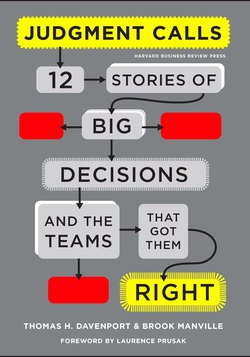Читать книгу Judgment Calls - Thomas H. Davenport - Страница 9
На сайте Литреса книга снята с продажи.
The Antidote to the Great Man Theory
ОглавлениеWe offer this book as an antidote for, and even the counter to, the Great Man theory of decision making and organizational performance. We view no individual man or woman as uniquely and solely responsible for wonderful outcomes; CEOs, political leaders, visionary thinkers, like all of us too, are living examples of at least occasional human frailty in thought and deed. Even the best leaders sometimes make bad decisions; the worst make them frequently, and perhaps one or more can bring down massive and hugely successful organizations.
Instead of Great Men, we'll preach the virtues of Great Organizations—organizations that build the ongoing capability to make great decisions again and again, reflecting the judgment to more consistently than not make “great calls” in difficult situations. Great Organizations expand the number of people involved in important decisions, because they know that while individual humans are fallible, in the aggregate they are usually more effective. They tap into their employees' (and customers' and partners') broad range of expertise, and they ask for their opinions; they deliberate and problem-solve toward a better answer, instead of “going with the gut.” They also employ data and analysis to make decisions, because they know that on the whole, the scientific method is the single best guide to decisions and actions the world has ever known. They employ sound decision-making processes, including investigating multiple alternatives, seeking out dissent, and fostering a decision culture of inquiry rather than advocacy. In short, they become effective decision machines in which Great Men aren't necessary or desired, at least in the sense of dictating an answer “just because s/he's the boss.”
When such organizations employ these approaches on an ongoing basis, we call it good organizational judgment.
Of course, leaders are still important (though perhaps not 343 times more important as the average worker, as today's salary scales imply). Good leaders create the agenda of decisions to be made. They set the tone for culture and decision processes. They encourage the diverse members of their organizations to step up and participate in deliberations and decisions. We are not dismissive of leadership and leaders in this book at all, but we think they have a new set of roles to play. The Great Man (or Woman) of the future knows the role of the great leader is not to decide important questions alone—but rather to ensure that all the right things happen across their organizations so that the best thinking and the best problem solving results in a better answer.
